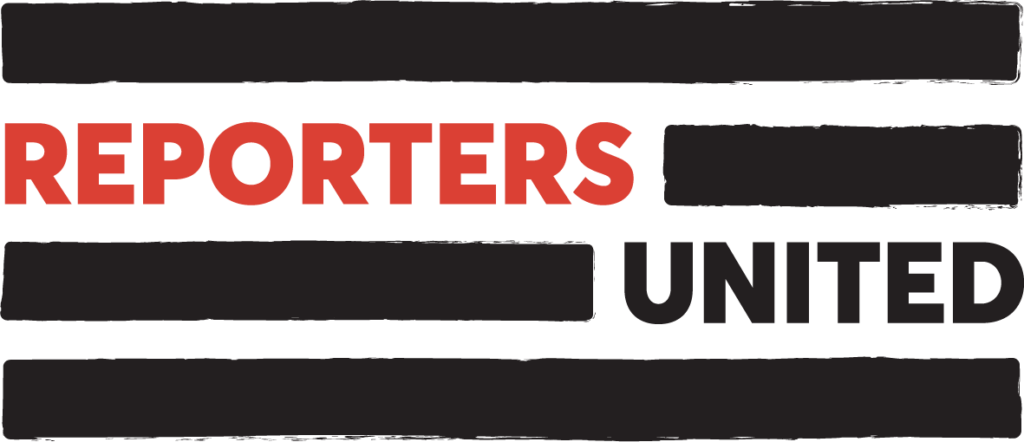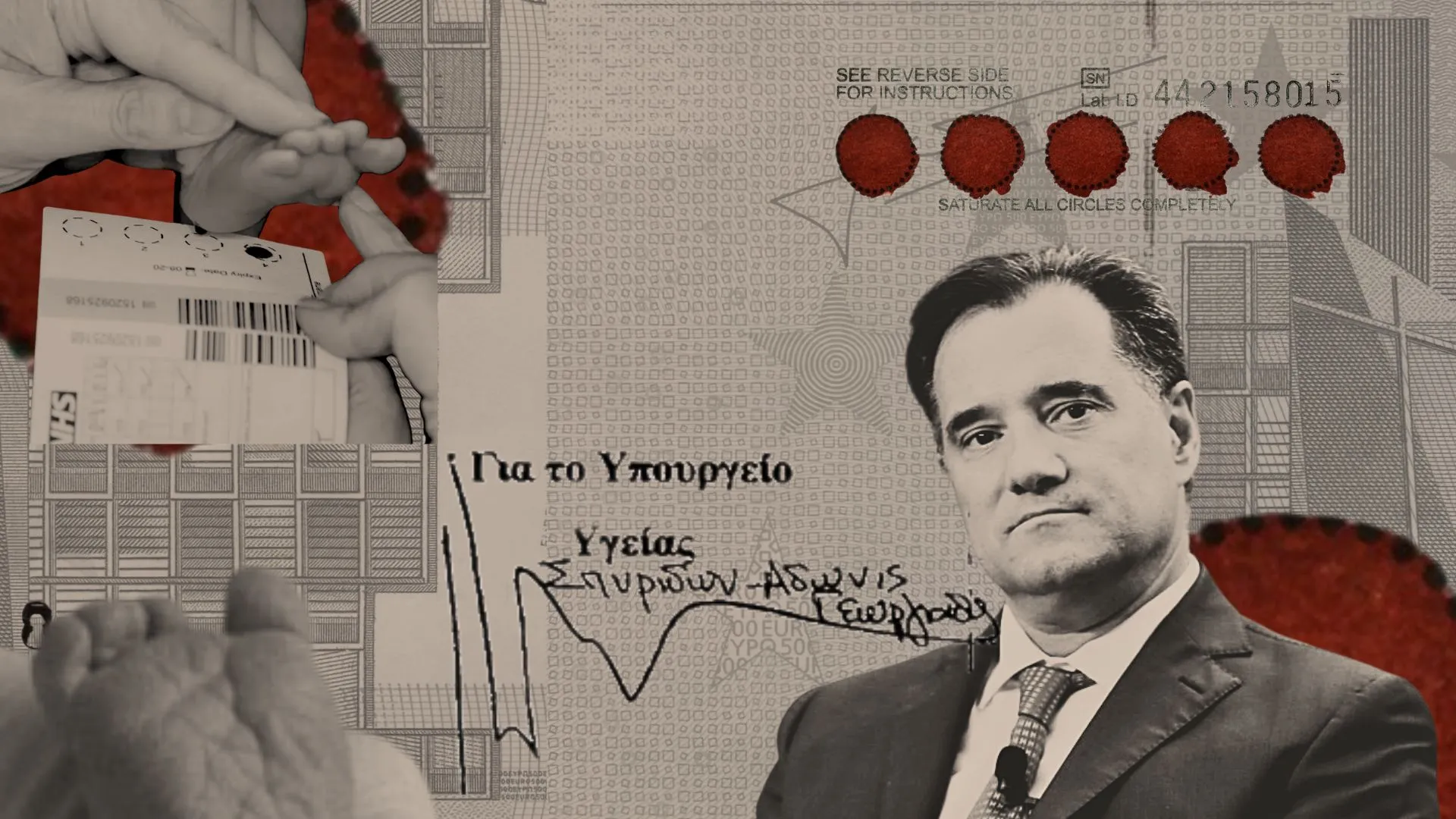Illustration: Konstantina Maltepioti
Editing: Eurydice Bersi
The original investigation was published in Greek on 11 April 2025 under the title “Adonis Georgiadis grants private companies access to newborns’ DNA.” This is a shorter English version of that first report, updated to include the full scope of the civil society campaign sparked by the initial exposé.
It seemed as if Greece had stepped into a remake of ‘Gattaca’ – a world where every child’s future is predetermined by genetic analysis – infused with a hint of ‘Orphan Black’ in the veil of secrecy surrounding it.
Only this wasn’t science fiction; it was present-day reality straight out of a dystopian nightmare.
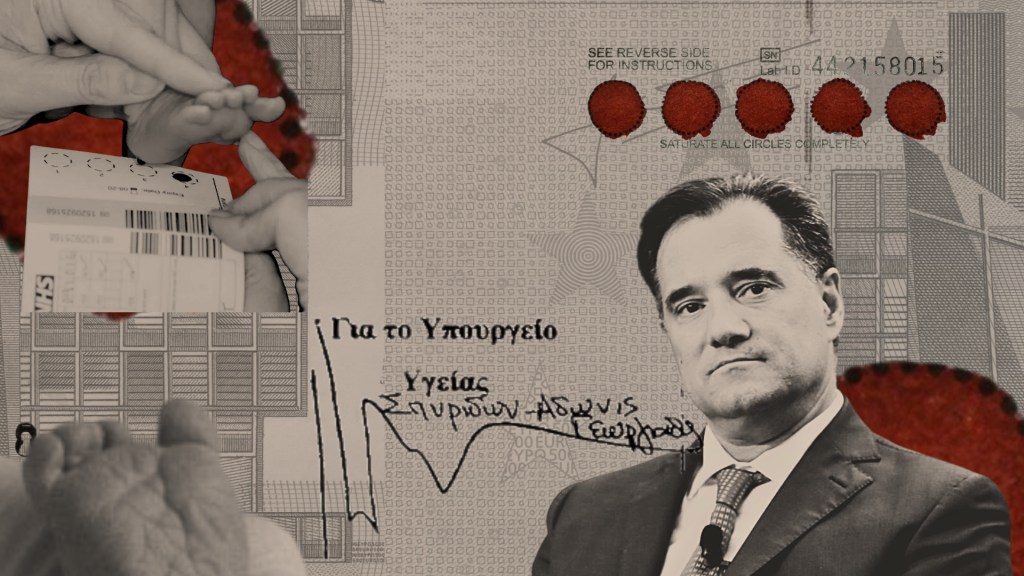
The Greek government had secretly agreed to allow two private companies full access to the DNA of newborns in Greece through a massive genomic screening project. Conspicuously missing from the project agreement: clear terms and conditions, safeguards to protect highly sensitive personal data, any requirement for parental consent, let alone revocable consent.
Compared to existing biochemical screening of newborns (five drops of blood screened for specific diseases) the difference would be huge. The secret program would introduce whole genome sequencing, an experimental technique raising significant technical and bioethical concerns.
Research data obtained from newborns’ DNA analysis would be the “exclusive property” of the private companies.
A strict confidentiality clause ensured the relevant contract was never published on the state transparency portal, Diavgeia, and that the Greek people would remain unaware that their genetic profile had been handed over to business entities.
Indeed, the genetic material of 100,000 people born in Greece risked ending up in the hands of private US-based actors, without clear terms or safeguards. This project would result in an immensely valuable genetic profile registry — something of significant interest to powerful corporations such as those in the pharmaceutical and insurance industries.
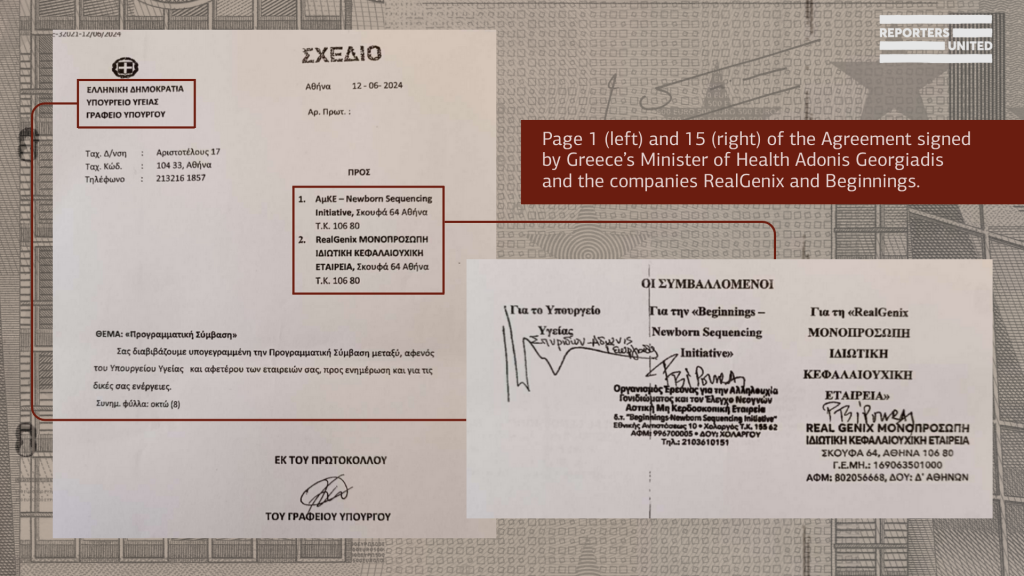
The secret agreement
The 15-page Programmatic Agreement (in Greek, here) was signed on 17 May 2024 by Greece’s minister of Health Adonis Georgiadis and the companies RealGenix and Beginnings, represented by clinical geneticist Petros Tsipouras, a Greek national and permanent resident of the United States.
Both companies are registered in Greece. Real Genix is a wholly owned subsidiary of PlumcareRWE, headquartered in the US.
The agreement’s aim was to introduce universal whole-genome screening for newborns in Greece by 2029. Titled ‘First Steps’, the project was set to start in January 2025 and be conducted in two phases drawing DNA from 100,000 newborns – 25%–30% of the babies expected to be born in Greece over the five-year period of the agreement – and potentially expanding to all newborns should the program be officially adopted in the future.
The agreement explicitly stated that the research results from the sequencing of the newborns’ genomes shall “constitute property of RealGenix.”
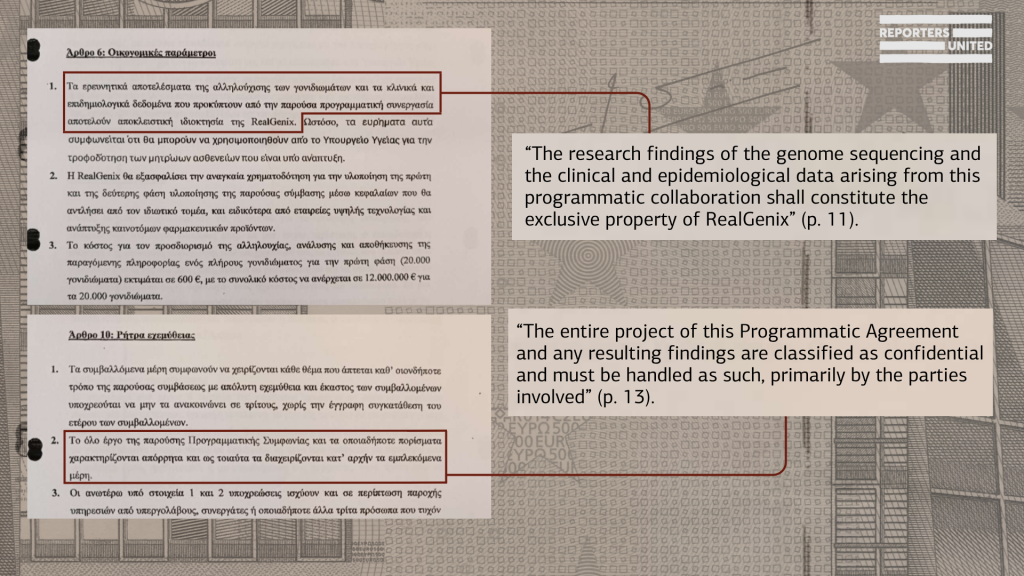
The agreement stated that the research findings “will be fully disconnected from the subjects’ personal data,” yet it did not specify concrete safeguards to ensure this commitment. Εven anonymised, this data, the genetic profile of a nation, would be an extremely valuable asset in the hands of the private company involved, experts said.
The estimated cost for the sequencing, analysis, and storage of 100,000 full genomes was stated in the agreement as €56 million, which would be covered by the companies – at no cost for the Greek state. The companies would then retain “exclusive ownership of the research findings.”
According to the agreement, project financing would come “from the private sector, specifically from high-tech and innovative pharmaceutical development companies”. There were no clear clauses prohibiting commercial exploitation, data monetisation, etc.
The companies did not provide any information or guarantees on how they planned to raise the millions needed to fund this project (RealGenix and Beginnings have a cumulative initial capital of only €8.000, according to the Hellenic General Commercial Registry). In an interview (in Greek) with Reporters United, Mr Petros Tsipouras claimed that funding for the initial phase in 2025 was nearly secured through donations from charitable foundations, with no involvement from tech or pharmaceutical companies. (This statement contradicts the provisions of the agreement.) He refused to disclose further details, citing confidentiality.
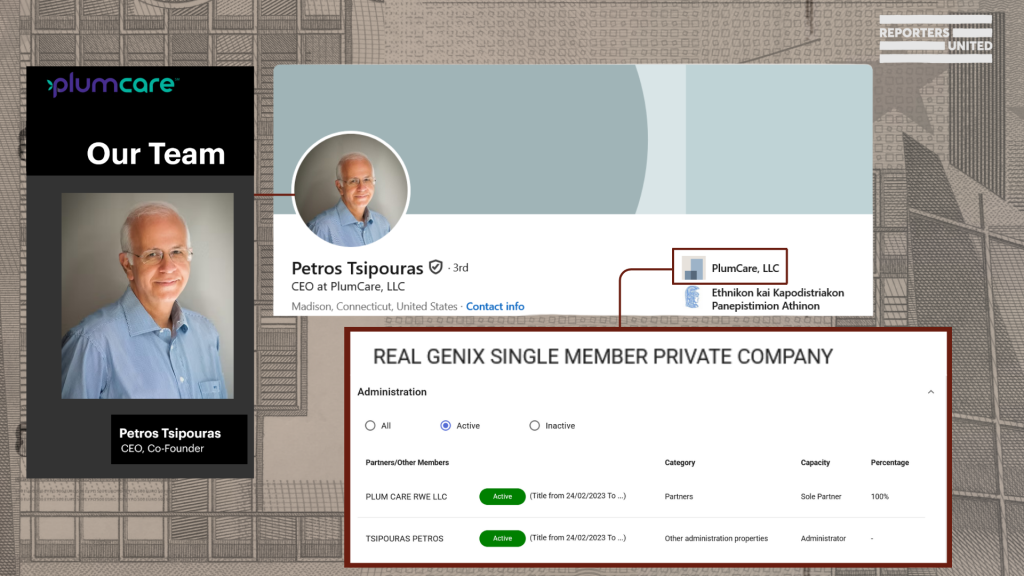
By 31 March 2025, the ICH was required to provide all samples collected during the first quarter of 2025 — an estimated 20,000 (that is, all projected births in the country), in exchange for €10 per infant paid by RealGenix.
This never happened. The ICH refused to divert blood collected for regular biochemical screening and to do so in total opacity, without parental consent.
Less than two weeks later, Reporters United and EfSyn broke the story, revealing the existence and the contents of the agreement.
The Institute of Child Health acts as guardian of newborns’ genetic data
This privatisation of newborn screening was being advanced without prior clear and valid scientific evaluation by any competent body.
Quite the contrary. The agreement was fiercely opposed by the ICH’s Scientific Council due to unresolved ethical, legal, and scientific issues.
In its unanimous October 2024 decision, which was revealed in April 2025 by Reporters United, the Council warned that giving away three out of the five routinely collected blood spots could compromise the existing newborn screening. It outlined major flaws in First Steps, stressing that genomic screening remains under international review, with no consensus on its broad adoption. Unlike biochemical tests, DNA sequencing creates lifelong data that could be reused — for forensics, insurance, and more — posing major risks of misuse and data exploitation, the Council stated.
You can read the ICH’s decision in full [here, in Greek].
A Health Minister acting more like a broker
The entire initiative increasingly appeared to be the minister’s personal venture. Adonis Georgiadis signed the agreement, reportedly bypassing standard procedures within his own ministry.
In October 2024, in a video address at the International Conference of the International Consortium on Newborn Sequencing (ICoNS), Georgiadis promoted First Steps-genomic screening as if it were an established medical practice, free of any risks or bioethical concerns. It is a “revolutionary technology providing personalised and timely care for newborns,” he said.
Greek Health minister Adonis Georgiadis addresses the International ICoNS Conference advocating for the immediate, large-scale implementation of genomic screening in Greece. The Greek program had no scientific or bioethics authority approval.
The minister stuck to the same line of argument after the project was exposed: “Ιf I can save even one child, I will,” he said.
He also claimed that the Supervising Committee – established by his own ministerial decision on 9 January 2025 – was the project’s ethics watchdog. However, our reporting revealed that four of the committee’s seven members were representatives of the two contracting companies, and one was appointed directly by the minister.
Lessons Greece chose to ignore
The global initiative ICoNS features a map with 13 locations in Europe, the USA, and Australia where pilot genomic screening projects are run by its “contributing partners” – including First Steps.
Seven out of the 13 ICoNS projects have not been approved by Institutional Review Boards, research ethics bodies protecting the rights and welfare of the people recruited to participate in research studies.
One of them is First Steps.
Μost genomic newborn screening projects follow roadmaps and protocols approved by competent authorities. They are studies or pilot programs — none is implemented population-wide or integrated into a national health system as an approved preventive medicine program. First Steps is the only one that states it “aims to establish universal newborn genomic screening (NGS) as the standard of care within five years.”
Perhaps the most extensive such research study in Europe has been conducted in the United Kingdom. It is the Generation Study in partnership with the NHS, which started in 2023 and aims to sequence the genomes of 100,000 newborns. A very strict roadmap has been followed, including “extensive consultation with the public, parents and families affected by rare conditions as well as healthcare professionals, policy makers and scientists.” A detailed protocol was approved by the Health Research Authority, while the results will be reviewed by the NHS to “inform future decisions on using whole genome sequencing to support newborn screening.”
The specifications set by British scientists fully align with the remarks of the Scientific Council of Greece’s ICH. But none of these prerequisites have been met in the Greek First Steps program.
‘For Our Children’s DNA’: Scientific outcry
A series of seven articles by Reporters United and Efimerida ton Syntakton, dozens of social media posts and direct exchanges with the minister sparked widespread outcry which in turn led to a civil society campaign that minister Georgiadis was unable to stop.
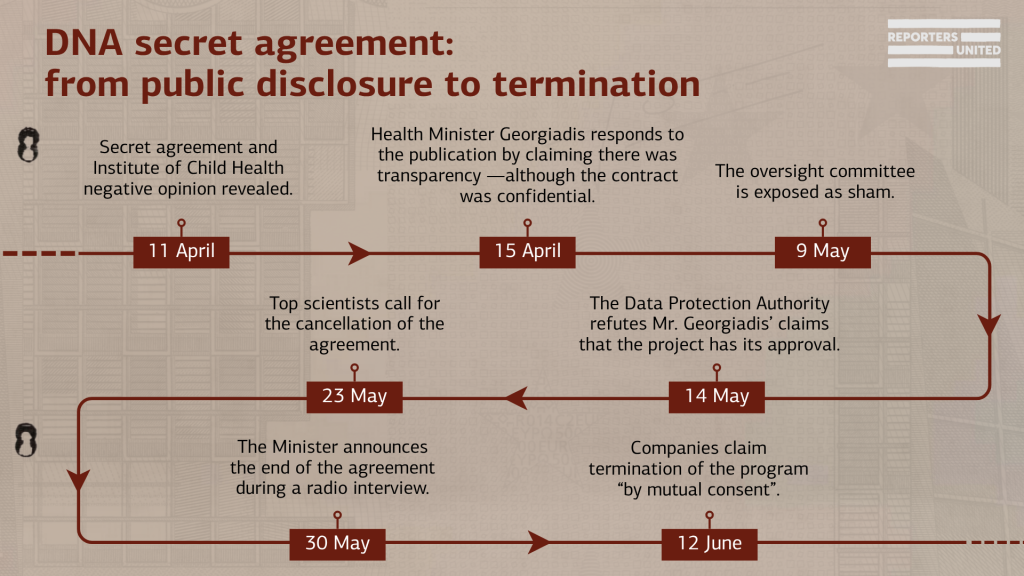
Scientific associations, unions and digital rights organisations issued press releases urging caution or/and calling for the cancellation of the agreement.
On 23 May an open letter titled ‘For Our Children’s DNA’ signed by 195 leading scientists from key fields such as biology, genetics, medicine, health sciences, law, bioethics, and social sciences, as well as engaged citizens, detailed the flaws of the agreement and urged the government to cancel it. The call collected more than 4,000 signatures within a few days (the letter in English here).
Spyros Artavanis-Tsakonas, Professor Emeritus of Cell Biology at Harvard University, a signatory, held the “utterly unacceptable agreement” as evidence that “in Greece anyone can do as they please”. There is a “complete lack of understanding of scientific matters,” he lamented. Leading experts who signed the petition include Stylianos Antonarakis, John Christodoulou, Argiris Efstratiadis, Manolis Kogevinas, Elias Kouvelas, Haralampos Moutsopoulos, Charalambos Savakis, Nektarios Tavernarakis, Jan Traeger-Synodinos and others.
Bolstering the movement’s scientific momentum, the European Society of Human Genetics (ESHG) –a non-for profit with 3,500 members, headquartered in Vienna, and a founding member of the International Federation of Human Genetics Societies– also weighed in.
The ESHG warned in a statement on 11 June that applying broad genetic testing to newborns outside a research framework is “irresponsible,” as the method’s risks and benefits remain largely unknown. The lack of transparency, they argue, “could affect the trust of the public in newborn screening and in healthcare more widely – and not just in Greece.”
Notably, despite Reporters United reaching out to all scientists reportedly involved in ‘First Steps’, not a single one responded to publicly defend the programme. The only outspoken supporters have been minister Adonis Georgiadis and the scientific lead of ‘First Steps’ Petros Tsipouras, who is also the manager of RealGenix, co-founder and CEO of its parent company Plumcare, and co-manager of Beginnings.
Professor of Computer Science at MIT Constantinos Daskalakis, who until recently appeared on Plumcare’s website as Chief Technology Officer, has now been removed from the website. Mr. Daskalakis did not respond to a question by Reporters United about this.
By the end of May, the issue had reached mainstream politics, as six opposition parties tabled questions on the matter to the Greek Parliament and the European Commission.
The Institute of Child Health was meanwhile flooded with messages of concern from anxious parents of newborns. Some even submitted formal requests demanding the destruction of their babies’ blood samples — samples taken as part of the standard screening program designed to detect life-threatening conditions early, where swift diagnosis can mean the difference between full recovery and irreversible harm.
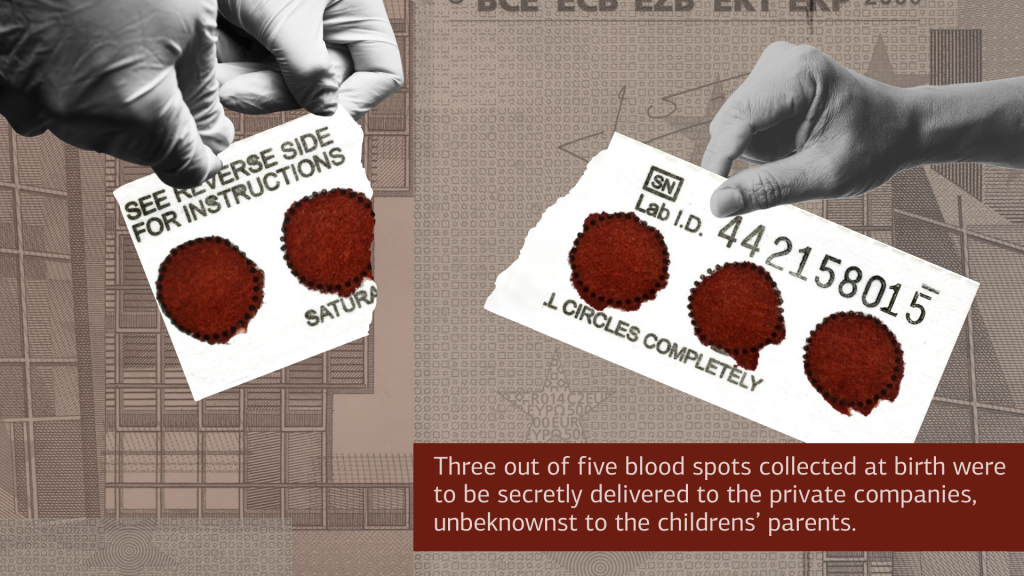
In response, the Administrative Committee of the ICH issued a press release on 28 April ensuring the public they are not handing away blood samples entrusted to them unless explicit written parental consent is obtained.
First Steps suffered further discredit when Rady Children’s Institute for Genomic Medicine (USA) and the BeginNGS Consortium denied in a statement to Reporters United any involvement in newborn screening programs in Greece.
Plumcare, the parent company of Real Genix, had previously advertised a partnership with Rady Institute “to establish the first international site for BeginNGS (a pilot newborn genomic screening programme) in Greece.” Although talks collapsed in 2022, the supposed collaboration continued to be locally promoted in Greece in what appeared to be an attempt to bolster First Steps’ credibility.
From Soloist to Silent: The minister’s ‘Greek’ Retreat
Then came the spectacular U-turn, live on air. We were grilling Adonis Georgiadis together with radio host Yorgos Avgeropoulos in a two hour-long show when he abruptly changed tack “…it seems that we are not making any progress with this specific team… So, there’s really no point in arguing anymore,” he acknowledged.
It was May 30th, the battle had gone on for 49 days.

On 12 June, First Steps announced the termination of its agreement with the ministry of Health “by mutual consent”.
“We will remain vigilant in case there are attempts to implement this approach, possibly under a different guise,” says Takis Panagiotopoulos, Emeritus Professor at the National School of Public Health, a paediatrician – epidemiologist, and leading member of the “Initiative For Our Children’s DNA”. After his change of heart, Mr Georgiadis had invited the scientists to come up with proposals for a proper regulatory framework. Dr Panagiotopoulos says they intend to do exactly that. “We plan to initiate a public discussion among experts and the wider society on the scientific, ethical, and societal implications of using human genome sequencing” he says. “We must shed light on existing gaps in the country’s legal-ethical, research, and healthcare regulatory frameworks, and propose solutions.”
